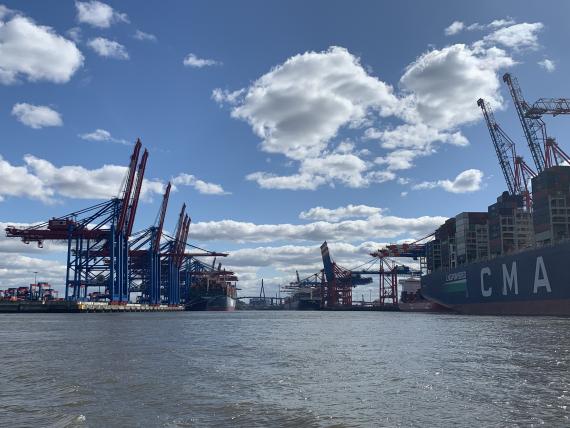A Message from Münster
It may seem somewhat strange to accompany a piece of writing titled “A Message from Münster”
with an image taken in the port of Hamburg. Yet, I was inspired to do so by what that image
represents: the value of exchange. Taking part in the Seattle-Münster program a second time, I am
well aware of the benefits of exchange. Hamburg Port, tied with L.A. as the 17 th busiest port in the
world, exemplifies the sort of activity and growth that accompanies engagement with other places
and peoples. As my fellow passengers and I, many of them non-German speakers, made our way
on the tour boat through the busy waterways that crisscross the city of Hamburg, we were awed at
the scale of the trade that came through the port, including a container ship (seen on the left hand
side in the image) that was the second largest in the world, carrying some 22,000 containers full
of goods from all over the globe. Looking beyond the material value of those commodities, I
considered their more abstract significance as an indicator of human capacity and ambition,
comparing that with my own experience in academic exchange.
While I cannot claim to have generated the roughly 1.5 billion euros of revenue that port
boasts (oh, if only), my time here has been highly productive, owing in great part to the city’s many
amenities and the stimulating environment that exists at the WWU-Münster’s Germanistik-Institut.
Attending events and discussions at the Lehrstühle of Prof. Wagner-Egelhaaf and Prof. Kai Sina,
who will administer the program beginning next academic year as Prof. Wagner-Egelhaaf enters
into retirement, has clearly had an impact on my work and output. In addition to making progress
on the dissertation, I have written two public-facing pieces of writing for the Transatlantic Literary
History blog about a conference organized at the university on the topic of “Rethinking the West:
Promise and Crisis of a Concept.” I am publishing a contribution for a special forum on “Race and
Imperialism in the Age of Goethe” in the upcoming edition of the Goethe Yearbook on Goethe’s
Faust, its critique of colonialism, and my changing perspectives on the story over the course of
my career. I am presenting at three conferences over the next 8 months: at the 72 nd Postgraduate
Colloquium in London on “The Ethics of Narrating Catastrophe: Heinrich von Kleist’s Das
Erdbeben in Chili,” at the European Summer School in Cultural Studies at the Universität Gießen
on “Foggy Pasts, Shifting Presents, Uncertain Futures: Wilhelm Raabe’s Pfisters Mühle: Ein
Sommerferienheft,” and at the MLA Annual Conference in Philadelphia on “Energetic Waterways:
The Flow and Ebb of Germany’s Rivers from Werther to Pfisters Mühle.” I am also co-organizing
with Prof. Christoph Weber (Univ. of North Texas) a panel on “Catastrophe and Critique” at the
GSA Annual Conference in Montréal, which will then be followed by a collaboration on and
contribution to an edited volume of essays on the same topic. As well as teaching English language
courses on Academic Writing, Debating in English, and U.S. Culture, I will have the opportunity
to deliver a guest lecture on the topic of Goethe, Winckelmann, and the reception of Antiquity in
the 18 th Century for an undergraduate course offered by Prof. Sina. Lastly, I have become an editor
for Process: Journal of Multidisciplinary Undergraduate Scholarship.
As I approach the end of my time as a Ph.D. Candidate in the Department of German
Studies (though I will return for one final year), I am thankful to have had this final chance to take
part in the Seattle-Münster Exchange. It provided me the much-needed time and space to set things
in order and pursue many avenues of interest. After the dark years of the pandemic, the future dares
to look bright.
With care and well wishes,
Matthew Childs
